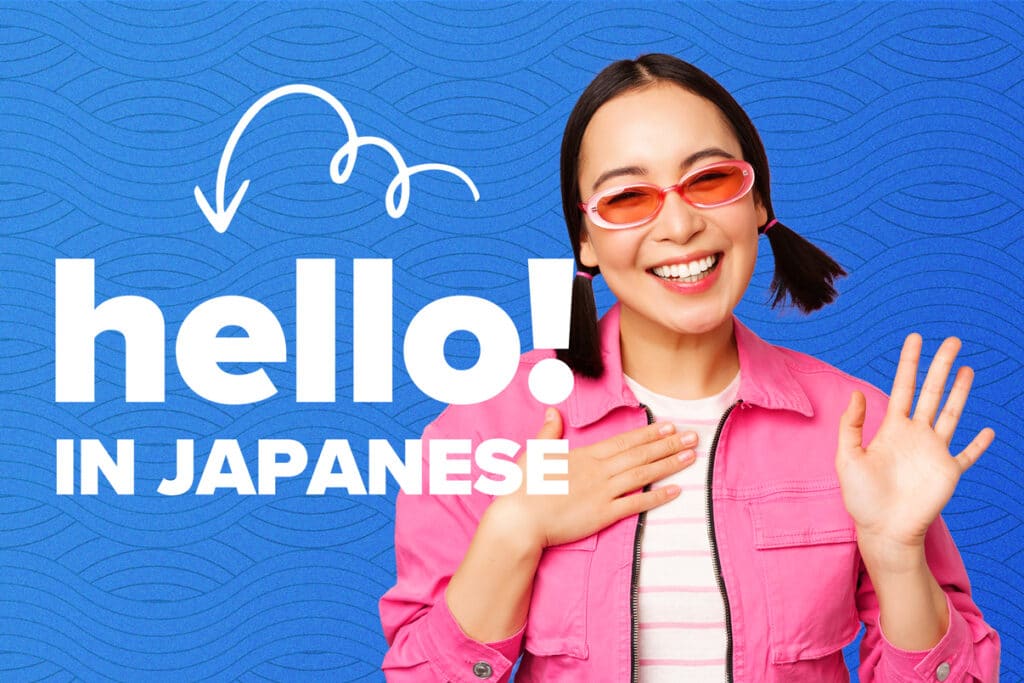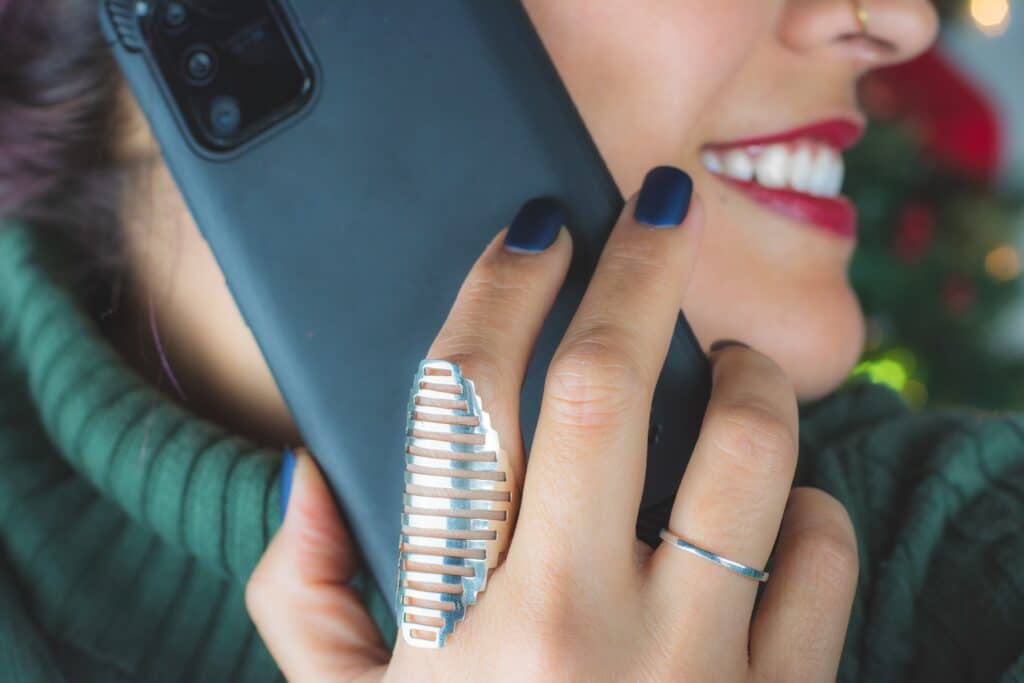
How to Say Hello in Japanese: 25 Greetings for Different Occasions [With Audio]
Every friendship and conversation begins with a “hello.”
Keep reading to learn how to say hello in Japanese at various degrees of formality, so you can greet everyone from your closest friend to your boss.
Plus, you’ll find out when to use each new term and see examples of how they’re used in context.
Let’s begin—or as we say in Japanese, 始めましょう (はじめましょう!) — Hajimemashō!
Contents
- How to Say Hello in Formal Situations
- How to Say Hello in Informal Situations
- 8. Yā! / Ya hō! — Hi
- 9. Ōi! / Osu! / Ossu!— Hey!
- 10. Yo! — Yo!
- 11. Ohayou — Good morning
- 12. Genki datta? — How are you?
- 13. Kyōwa donna kanji? — How are you today?
- 14. Saikin dō? / Nan ka atta? — What’s up?
- 15. Dōyo? — How’s it going?
- 16. Chōshi dō? — How’s it hangin’?
- 17. Tadaima! — I’m home!
- 18. Maido — Welcome
- 19. Yōkoso! — Welcome home / Welcome to Japan!
- 20. O hisashi buri desu — Long time no see
- 21. Hisashi buri — Long time no see
- 22. Daijōbu? — Are you okay?
- Greetings for First Encounters
- How to Answer the Phone in Japanese
- How to Bow to Greet People in Japan
- And One More Thing...
Download: This blog post is available as a convenient and portable PDF that you can take anywhere. Click here to get a copy. (Download)
How to Say Hello in Formal Situations

1. Konnichiwa — Hello / Good afternoon
Japanese: こんにちは
This is the classic “hello” you may already be familiar with. It’s a way of greeting someone that’s appropriate for almost all occasions.
Since this word technically means “good afternoon,” it’s mostly used in the time between morning and evening.
こんにちは、元気ですか? (こんにちは、げんきですか?) — Konnichiwa, genki desu ka? (Hello, how are you?)
2. Ohayō gozaimasu — Good morning
Japanese: おはようございます
This is the formal way of saying “good morning.” It’s used when meeting with a superior or someone you don’t know well in the early hours.
See #12 on the list for the informal version.
おはようございます、今日も頑張りましょう! (おはようございます、きょうもがんばりましょう!) — Ohayō gozaimasu, kyō mo ganbarimashō! (Good morning, let’s do our best today!)
3. Konbanwa — Good evening
Japanese: こんばんは
You can use this phrase when greeting someone in the evening. You wouldn’t use it as a send-off when saying “good night” to someone (you do that with おやすみなさい or oyasuminasai.)
こんばんは、ゆっくり休んでくださいね。 (こんばんは、ゆっくりやすんでくださいね。) — Konbanwa, yukkuri yasunde kudasai ne. (Good evening, please take your time to rest.)
4. Ikaga osugoshi desu ka? — How are you doing?
Japanese: いかがお過ごしですか? (いかが おすごし ですか?)
This is a very formal way to ask how someone is doing. Use this phrase when speaking to a manager, an older person or someone of authority you don’t know very well.
いかがお過ごしですか?お忙しい日々ですか? (いかがおすごしですか?おいそがしいひびですか?) — Ikaga o-sugoshi desu ka? O-isogashii hibi desu ka? (How are you doing? Are you busy these days?)
5. O genki desu ka? — How are you?
Japanese: お元気ですか? (おげんきですか?)
This is a good phrase to use after greeting a somewhat new friend or someone you don’t know well. The literal meaning is “Are you healthy?”
It’s a formal phrase you can also use with friends and family and implies a very earnest interest in how someone is doing. Don’t lead straight in with this phrase, though. Make sure you say “hello” first, or your greeting may seem abrupt and unnatural.
お元気ですか?最近いい調子ですか? (おげんきですか?さいきんいいちょうしですか?) — O-genki desu ka? Saikin ii chōshi desu ka? (How are you? Are you in good spirits lately?)
6. Irasshaimase! / Maido, irasshaimase — Welcome!
Japanese: いらっしゃいませ! / 毎度、いらっしゃいませ (いらっしゃいませ!/ まいど、いらっしゃいませ)
If you visit Japan, you’ll definitely hear this phrase at least a few times, especially when entering convenience stores or restaurants.
The literal translation of 毎度、いらっしゃいませ (Maido, irasshaimase) is “each time” or “every time,” which essentially means “we will always welcome you.” The 毎度 (まいど) — maido is often dropped to just say “welcome!”
When you’re greeted with いらっしゃいませ!(irasshaimase!), you can respond with a smile and a nod, or by saying ありがとう — arigatou (thank you) or こんにちは — konnichiwa (hello).
いらっしゃいませ!どうぞおくつろぎください。 — Irasshaimase! Douzo o-kutsurogi kudasai. (Welcome! Please make yourself comfortable.)
7. Daijōbu desu ka? — Are you okay?
Japanese: 大丈夫ですか? (だいじょうぶ ですか?)
This is a phrase you’ll often hear on television, typically after someone has been hurt or embarrassed.
In everyday situations, you can use it if you notice someone is struggling, or if you’re greeting a friend with a long face. Think of it as asking “You good?”
大丈夫ですか?それはひどい転倒でしたね。 (だいじょうぶですか?それはひどいてんとうでしたね。) — Daijōbu desu ka? Sore wa hidoi tentō deshita ne. (Are you okay? That was a bad fall.)
How to Say Hello in Informal Situations

8. Yā! / Ya hō! — Hi
Japanese: やあ / ヤッホー! (やあ / やっほー!)
This is the equivalent of saying “hi,” “yo” or “hey” in English. It’s appropriate for greeting a close friend, though it can also be used to get someone’s attention.
It’s an enthusiastic way to say hello, often used by the younger generation.
ヤッホー!元気にしてる? (やっほー!げんきにしてる?) — Yahhō! Genki ni shiteru? (Yahoo! Are you doing well?)
9. Ōi! / Osu! / Ossu!— Hey!
These are more like exclamations than greetings, but they’re useful if you need to get someone’s attention, similar to saying “hey you.”
All three words can be seen as gruff and masculine, and are mostly used between young men.
おっす!今日は何する (おっす!きょうはなにする?) — Ossu! Kyō wa nani suru? (Hey! What are you going to do today?)
10. Yo! — Yo!
Japanese: よぉ!
This is another exclamation used when trying to get the attention of someone you know very well. This is typically said by younger men, but any gender can use it.
よぉ!一緒に遊びに行こうぜ! (よぉ、いっしょにあそびにいこうぜ!) — Yō! Issho ni asobi ni ikōze! (Hey! Let’s go play together!)
11. Ohayou — Good morning
Japanese: おはよう
This is the informal way of saying “good morning,” which is a shorter version of the formal way (#2 on the list).
If you’ve been working at the same place or been part of the same class for a long time, this would be an appropriate way to greet everyone in the morning.
おはよう。 昨夜はよく眠れましたか? (おはよう。さくやはよくねむれましたか?) — Ohayou. Sakuya wa yoku nemuremashita ka? (Good morning. Did you sleep well last night?)
12. Genki datta? — How are you?
Japanese: 元気だった? (げんき だった?)
This phrase is a casual way to ask how someone’s been doing. Its informal nature makes it a good option for greeting friends.
You can also completely drop the second half and simply ask 元気? (げんき?— genki?)
元気だった?最近、お気に入りの曲を見つけましたか? (げんきだった?さいきん、おきにいりのきょくをみつけましたか?) — Genki datta? Saikin, o-ki ni iri no kyoku o mitsukemashita ka? (How are you? Have you found any favorite songs lately?)
13. Kyōwa donna kanji? — How are you today?
Japanese: 今日は、どんな感じ? (きょうは、どんな かんじ ?)
This phrase literally means “How is it today?” and is appropriate for most social interactions, especially when building rapport with your coworkers.
今日は、どんな感じ?仕事は忙しいですか? (きょうは、どんなかんじ?しごとはいそがしいですか?) — Kyō wa, donna kanji? Shigoto wa isogashii desu ka? (How do you feel today? Is work busy?)
14. Saikin dō? / Nan ka atta? — What’s up?
Japanese: 最近どう? / 何かあった? (さいきん どう? / なんか あった?)
最近どう?(Saikin dō?) implies the question “How have you been?” while 何かあった?(Nani ka atta?) can literally be translated as “What happened?” or “What’s happening?”
You can use either phrase when you meet up with a friend, especially after they had some kind of event like a job interview. You might receive a response somewhere along the lines of “I had a good day” or “I’ve been good.”
最近どう?最近旅行に行きましたか? (さいきんどう?さいきんりょこうにいきましたか?) — Saikin dō? Saikin ryokō ni ikimashita ka? (What’s up? Have you recently gone on a trip?)
15. Dōyo? — How’s it going?
Japanese: どうよ?
This phrase usually follows a greeting and is a casual way to inquire how someone’s doing. It literally means “How is it?” and the closest equivalent in English is “How’s it going?” or “How’s life?”
どうよ?最近は何か面白いことがあった? (どうよ?さいきんはなにかおもしろいことがあった?) — Dō yo? Saikin wa nanika omoshiroi koto ga atta? (How is it? Have there been any interesting things happening recently?)
16. Chōshi dō? — How’s it hangin’?
Japanese: 調子どう? (ちょうし どう?)
The literal translation is “How is your condition?” This phrase shouldn’t be used with someone of a higher social position than you. Instead, it’s best used with very good friends with whom you have a goofy, fun-loving relationship.
調子どう?最近の趣味はどんな感じ? (ちょうしどう? さいきんのしゅみはどんなかんじ? ) — Chōshi dō? Saikin no shumi wa donna kanji? (How are you feeling? How are your hobbies going lately?)
17. Tadaima! — I’m home!
Japanese: ただいま!
This phrase is a pretty interesting phenomenon in Japan. Many Japanese people use it when entering their homes after a long day, even if they live alone. You’ll see this in Japanese movies and television quite often.
The proper response when someone comes home and says this phrase, is お帰りなさい (おかえりなさい) — Okaerinasai (Welcome back).
ただいま戻りました。 (ただいまもどりました。) — Tadaima modorimashita. (I’m back now.)
18. Maido — Welcome
Japanese: 毎度 (まいど)
This is the less formal version of #6 on the list. While the formal version is heard in businesses and is generally directed at you, 毎度 (maido) can simply be used to say “hi” any time of day with anyone.
This greeting is an example of Kansai-ben and is more often used in the Kansai region of Japan.
まいど、おっす!何してんの? (まいど、おっす!なにしてんの?) — Maido, ossu! Nani shiten no? (Hey, what are you up to?)
19. Yōkoso! — Welcome home / Welcome to Japan!
Japanese: ようこそ!
This is an extremely common phrase to say after someone arrives after a long flight or traveling a long way. You’ll hear people say this when you arrive in Japan.
You may also hear the more formal version, 日本へようこそ! (Nihon e youkoso) or “Welcome to Japan!”
If you’re being greeted by an acquaintance or someone hired to pick you up from the airport, a simple ありがとう — arigatou (thank you) will do. For a friend or family member, an enthusiastic ただいま — tadaima (I’m home) is a good response.
ようこそ!私たちの街へお越しくださいました。 (ようこそ!わたしたちのまちへおこしくださいました。) — Youkoso! Watashitachi no machi e o-koshi kudasaimashita. (Welcome! Thank you for coming to our town.)
20. O hisashi buri desu — Long time no see
Japanese: お久しぶりです (おひさしぶりです)
This phrase is the equivalent of “Long time no see” or “It’s been a while” in English and usually follows a basic “hello” greeting.
While this is the formal version of the phrase, it’s used in frank and informal circumstances, like with an old friend or absent family member. As a general rule, the formal version is more often used by women than men.
お久しぶりです。お身体の調子はいかがですか? (おひさしぶりです。おからだのちょうしはいかがですか?) — Ohisashiburi desu. O-karada no choushi wa ikaga desu ka? (It’s been a while. How is your health?)
21. Hisashi buri — Long time no see
Japanese: 久しぶり! (ひさしぶり!)
When you drop the お or O off おひさしぶりです (O hisashi buri desu), you get this less formal version. It’s used a lot in Japanese and literally just means “long time.”
久しぶり!何か飲みに行かない? (ひさしぶり!なにかのみにいかない?) — Hisashiburi! Nanika nomi ni ikanai? (Long time no see! How about going for a drink?)
22. Daijōbu? — Are you okay?
Japanese: 大丈夫? (だいじょうぶ?)
This is the informal way of asking if someone is okay.
大丈夫です、助けはいりません。 (だいじょうぶです、たすけはいりません。) — Daijōbu desu, tasuke wa irimasen. (I’m fine, I don’t need help.)
Check out this video for a deeper dive into some of the most common ways to say hello in Japanese:
The video above includes formal, informal and unique greetings that don’t have an exact translation in English.
Greetings for First Encounters

23. O ai dekite kōeidesu — It’s an honor to meet you
Japanese: お会いできて光栄です (おあいできて こうえいです)
This is a very formal way to meet someone for the first time. It’s a good one if you’re meeting a potential new employer, for example, or a superior.
お会いできて光栄です。ご指導いただけると幸いです。 (おあいできてこうえいです。ごしどういただけるとさいわいです。) — Oaidekite kōei desu. Goshidō itadakeru to saiwai desu. (It’s an honor to meet you. I would greatly appreciate your guidance.)
24. Hajime mashite — Nice to meet you
Japanese: 初めまして (はじめまして)
This is the relatively more informal version of the previous phrase. Note that it’s still polite, as you’re using it with someone you’ve met for the first time!
When meeting somebody at a party, bar or at an event that’s not exactly a professional setting, this is the phrase you’d use.
初めまして、私は田中と申します。よろしくお願いします。 (はじめまして、わたしはたなかともうします。よろしくおねがいします。) — Hajimemashite, watashi wa Tanaka to mōshimasu. Yoroshiku onegaishimasu. (Nice to meet you, my name is Tanaka. Pleased to make your acquaintance.)
25. Watashi no namae wa… — My name is…
Japanese: 私の名前は… ( わたし の なまえ は…)
To make this phrase a bit less formal, you can drop the わたし の (watashi no) part and just say 名前は… (なまえは… — namae wa), which literally means “Name is…”
You can also ask for the other person’s name with this phrase: 名前は何ですか? (なまえ は なん です か?) — Namae wa nan desu ka? (“What is your name?” or literally “Name is what?”).
こんにちは、私の名前はジョンです。よろしくお願いします。 (こんにちは、わたしのなまえはじょんです。よろしくおねがいします。) — Konnichiwa, watashi no namae wa Jon desu. Yoroshiku onegaishimasu. (Hello, my name is John. Nice to meet you.)
How to Answer the Phone in Japanese

When answering the phone in Japanese, people say Moshi moshi — もしもし (Hello?). This phrase is only used on the phone.
For example:
もしもし、お父さん、お元気ですか? (もしもし、おとうさん、おげんきですか? ) — Moshimoshi, otōsan, ogenki desu ka? (Hello, Dad, how are you doing?)
You can see this common greeting for answering the phone in the video below, as well as a more formal way for business calls and a “millennial” form you might hear:
To answer a business call, you can also use one of the common formal greetings such as “Ohayō gozaimasu” — おはようございます (Good morning) or you could say “Odenwa arigatou gozaimasu” — お電話ありがとうございます (Thank you for calling).
How to Bow to Greet People in Japan

Aside from verbal greetings, there are nonverbal ways to say “hello” in Japanese. One of these is bowing.
Generally, here’s how you bow to greet people in a Japanese context:
- Stand straight. Keep your feet together and your arms flat on your sides.
- With your eyes forward, lower your head and bend at the waist. Note that the degree of the bow depends on the formality of the context.
For example, if you’re greeting a friend, a slight nod will do. But if you’re greeting a boss or superior, you should bow at a 45-degree angle at the very least.
- Hold the bow for a few seconds before you return to an upright position.
In this video, you can see the proper way to bow demonstrated for different situations:
For more examples of how to say hello in Japanese, you could try an online language learning platform like FluentU.
FluentU takes authentic videos—like music videos, movie trailers, news and inspiring talks—and turns them into personalized language learning lessons.
You can try FluentU for free for 2 weeks. Check out the website or download the iOS app or Android app.
P.S. Click here to take advantage of our current sale! (Expires at the end of this month.)

Now you know how to start a conversation in Japanese, but how do you end one? Check out these ways to say goodbye next!
Download: This blog post is available as a convenient and portable PDF that you can take anywhere. Click here to get a copy. (Download)
And One More Thing...
If you love learning Japanese with authentic materials, then I should also tell you more about FluentU.
FluentU naturally and gradually eases you into learning Japanese language and culture. You'll learn real Japanese as it's spoken in real life.
FluentU has a broad range of contemporary videos as you'll see below:

FluentU makes these native Japanese videos approachable through interactive transcripts. Tap on any word to look it up instantly.

All definitions have multiple examples, and they're written for Japanese learners like you. Tap to add words you'd like to review to a vocab list.

And FluentU has a learn mode which turns every video into a language learning lesson. You can always swipe left or right to see more examples.

The best part? FluentU keeps track of your vocabulary, and gives you extra practice with difficult words. It'll even remind you when it’s time to review what you’ve learned. You'll have a 100% personalized experience.
Start using the FluentU website on your computer or tablet or, better yet, download the FluentU app from the iTunes or Google Play store. Click here to take advantage of our current sale! (Expires at the end of this month.)


